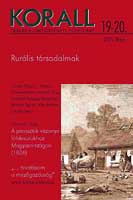Az értelmezés hatalma és a hatalom értelmezése. Az 1945 utáni társadalomtörténet fogalmi nyelvéről
The power of interpretation and the interpretation of power. On the conceptual language of post-1945 social history
Author(s): György MajtényiSubject(s): History
Published by: KORALL Társadalomtörténeti Egyesület
Keywords: Hungary; social history;20th century;1960's years; sociology; history of concepts; social mobility; socialist society; stratification
Summary/Abstract: The statistical sources and sociological studies dealing with the era of socialism cannot be used automatically to depict the stratification of society as the language and concepts used by the contemporary works of the period are strongly permeated by the ideology of the past system. The conclusions of the historical works on state socialism – seemingly well grounded and referenced – are often not only based on the processes examined but on the past and changes in the conceptual framework of sociology. Our present knowledge about the society of the age is, to a large extent, based on these concepts, too. It is this lack of conceptual self-reflection of historiography that explains that while several historians believe to be discussing social reality, in actual fact they are interpreting categories formulated in the wake of various party decrees. The automatic acceptance of the conclusions of the sociological works created in the various periods led to a historical image of the development of Hungarian society according to which this society was homogenized in the fifties, then gradually transformed from the sixties onwards, with further differentiation during the coming decades. Individual interpretations could only reach limited publicity during the period and could exert but a slight influence on social discourses: through its conceptual-linguistic dictatorship and the power of interpretation, the party –state was able to monopolize its own interpretation. Unless we are able to uncover the effects of the identity policy that lastingly created the virtual reality of socialist society, unless we recognize the nature and operation of the various discourses of power and science, we cannot reach an understanding of the period’s phenomena. Therefore, the question is not only whether the individual experiences of the age appear, or even can appear at all on the discursive levels of historical and sociological conceptualization, but also the extent to which the effects of these discourses transformed the empirical world of individuals.
Journal: Korall - Társadalomtörténeti folyóirat
- Issue Year: 2005
- Issue No: 19-20
- Page Range: 37-52
- Page Count: 16
- Language: Hungarian

